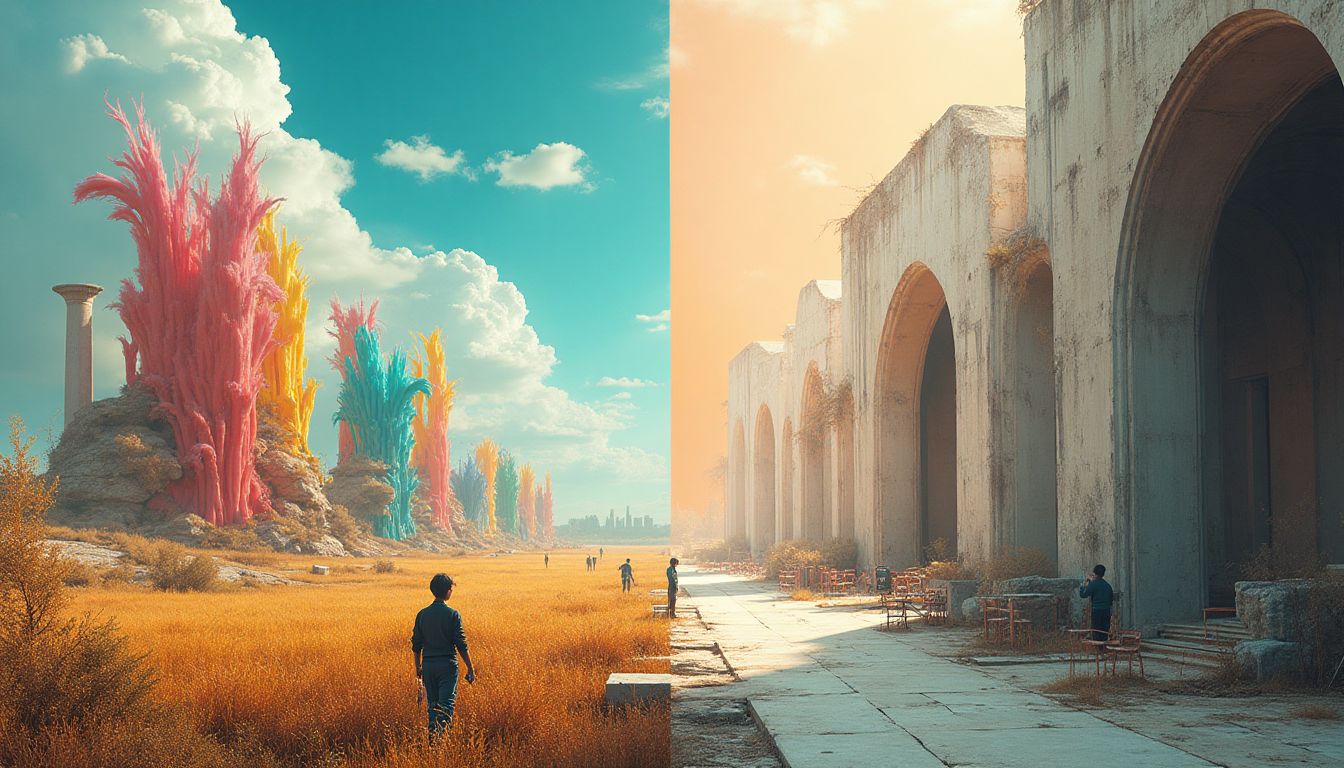Introduction
Work is a necessary evil to be avoided. These cheeky words, attributed to Twain, paint a stark notion about how some view the daily grind. But what if work, rather than being a mere obstacle, simply vanished? Would our days brim with creative energy or succumb to idle gloom? As Ludwig von Mises once mused about the fabric of society shaped by economic activity, we must ponder: if the fabric unravels, what will its threads become? Echoed by luminaries such as John Maynard Keynes, who predicted shorter work weeks with the rise of technology, and more recently by thinkers like Yuval Noah Harari, the post-work world beckons attention. Will liberated time kindle a renaissance of creativity, or will society freeze into a state of mental apathy? In this unfolding reality of automation and universal basic income, the ultimate question arises: are our idle minds poised for brilliance or at risk of stagnation?
The Nature of Work: Evolution and Relevance
Throughout history, work has evolved alongside humanity. From ancient agrarian societies relying on tilling the land to today’s bustling service economies, the concept of work continuously transforms. Once, work was all about survival; now, it's about identity and purpose. But as AI and technology march forward, reducing repetitive tasks, we edge closer to an era where work might become obsolete. What then, is the purpose of a day at leisure?
Remember the tale of the ant and the grasshopper? Let's imagine the grasshopper finds robots to do its work. One could assume endless play would ensue, but could it also invite existential dread? Just as the Industrial Revolution sparked growth and creativity, AI might usher in a novel experience, redefining productivity altogether.
Yuval Noah Harari, among others, warns of this transition. Echoing back to the words of Émile Durkheim, losing societal constructs may lead to anomie. But if channeled rightly, perhaps this is our next adventure—a quest for meaning absent of menial tasks.
Apprehension? Sure. Liberation? Possibly. As we teeter on the cusp of this seismic shift, could we redefine what it means to thrive outside work’s confines?
Armed with both the brush of innovation and the shadow of idleness, we stand at a promising yet uncertain juncture.
The Case for Creativity in a Post-Work World
Picture a world where you can do whatever you want, whenever you want without worrying about a paycheck. It sounds like paradise, right? This intriguing idea sparks discussions about whether this newfound freedom could unleash a tidal wave of creativity. Would the absence of the 9-to-5 grind lead to an artistic revolution or would everyone just binge-watch series until eternity? Before you decide, let’s dive into some fascinating examples from history and psychology.
Historical Precedents
In the Renaissance period, when artisans and thinkers roamed free Vienna's cobbled streets, society flourished with awe-inspiring creativity. When the rigid structures of feudal life began to crack, new forms of art and science bloomed like never before. Fast forward to the early 20th century, the Roaring Twenties, when the economic boom brought leisure and jazz to the forefront in cities like New York. It's not pie-in-the-sky thinking to imagine that less work could lead to more creativity if we channel our energies like the Dadaists did. They turned chaos into something beautiful!
Psychological Benefits of Leisure
Now, let's talk about leisure, the unsung hero of creativity. According to the American Psychological Association, unstructured time can foster novelty and imagination. Who knew idleness could be so productive? The Mozart Effect suggests that absorbing music can enhance learning and cognition. Maybe the next Mozart is just a few idle hours away. When there's less pressure, the mind wanders, creating connections and new ideas like a spider weaving its intricate web. So go ahead, take that nap, or a stroll without guilt. It’s all part of the creative process, like marinating before the grill!
The Dangers of Despair: Psychological Barriers
However, not all that glitters is gold. Alongside the promise of creativity, there's the shadowy threat of despair waiting to pounce on unsuspecting idle souls. What if unutilized time leads only to endless scrolling and existential dread rather than masterpieces and eurekas? Let's unravel this knot of anxiety together.
Mental Health Implications
The lack of structure can feel like a paradise at first, but for some, it could evolve into a crisis. The World Health Organization reports rising levels of anxiety and depression among those without regular life anchors. Imagine plunging into the weekend's embrace but never resurfacing. Scary, right? Without work's routine, there's a risk of losing one's sense of purpose. The mind, starved for challenges, might ask, "What's my story if it isn't 9-to-5?"
Social Isolation and Disconnection
And loneliness... oh, loneliness, that uninvited guest who crashes your party and refuses to leave. When the water cooler chatter dries up, so do the connections it fosters. Without work as a social hub, isolation can creep in like a fog. Studies by respected journals emphasize that regular social interaction is a key ingredient for mental well-being. Yet, as we step into a post-work scenario, how do we bake that cake without the key ingredient? Regular catch-ups with friends or joining clubs might mitigate this risk. Humans are social creatures, and even evolution’s favorite introvert, the hermit crab, eventually needs a shell suited for company. So, think twice before calling it quits on social "shell-cializing!"
Societal Impacts: Economy and Culture
As we stand on the brink of a new era—a time where work may no longer serve as the cornerstone of our identities—the ripple effects on both economy and culture could be seismic. Imagine a society where your value isn't tethered to a nine-to-five job but to the richness of your interactions, creativity, and contributions to a thriving cultural tapestry. Will we soar towards a renaissance, or plummet into a cultural quagmire?
Economic Restructuring
Let’s consider the economic dimension. A post-work world might potentially redefine our economic models. Consider Universal Basic Income (UBI), a concept where citizens receive a regular stipend with no strings attached. Designed to provide a financial cushion, UBI aims to reduce poverty by empowering individuals to pursue diverse interests.
The potential impact of UBI on consumer behavior is staggering. With financial stability, spending habits may shift from acquiring necessities to investing in personal fulfillment and education. The essential questions we face are: How will economies adapt? Will businesses thrive on niche markets, or collapse without conventional labor? The implications are as numerous as they are profound.
Cultural Renaissance or Decline?
Now for the cultural viewpoint, this upcoming epoch holds potential for a renaissance. With reduced work hours, individuals might discover and cultivate their latent talents—be it painting, writing, or musical prowess. History is littered with examples where the constraints of work lifted to reveal an explosion of creativity, like during the Renaissance itself.
But will culture truly flourish, or stagnate in the absence of shared work experiences? Without the structured social net of workplaces, feelings of isolation may increase, causing a cultural decline. Let's dissect this through a table depicting two contrasting scenarios:
| Positive Scenario | Negative Scenario |
|---|---|
| Prolific growth in the arts | Social isolation increases |
| Diverse cultural exchanges flourish | Engagement in cultural activities dwindles |
| Projects gain fresh perspectives | Loss of motivation without work structures |
Ultimately, the cultural future rests on how we leverage leisure time, societal structures, and communal bonds to foster a vibrant cultural ecosystem—or allow stagnation to seep in.
Case Studies: Nations Experimenting with Post-Work Philosophies
Across the globe, countries are already experimenting with post-work philosophies. Picture a world where Monday blues are obsolete, and embracing creative pursuits is the norm. What do these real-world implementations teach us about the potential—and pitfalls—of this bold new world?
Experiments in Scandinavia
Let's journey to Scandinavia, a region celebrated for its progressive social policies. Countries like Finland have pioneered UBI trials, albeit with mixed results. Their pilot scheme, where participants received a basic wage, aimed to measure the impact on employment and well-being.
Key reflections from the findings suggest:
- Participants generally reported increased happiness and reduced stress levels.
- However, substantial employment boosts were not observed, raising questions about necessity versus comfort.
- The mixed results indicate a delicate balance between ensuring financial security and motivating productive engagement.
Global Perspectives
Beyond the European frontiers, other nations explore similar waters. In New Zealand, reduced workweek trials have been embraced, yielding increased productivity and employee satisfaction. Studies, such as those published by Brookings Institution, emphasize that shorter workdays can enhance morale, ultimately boosting efficiency.
These global case studies illustrate the possibilities and hurdles of relinquishing traditional work structures. The lessons learned advocate for nuanced policies tailored to cultural and economic specificities, ensuring society evolves in harmony with technological advancements.
As trailblazers lead the charge, the rest of us watch, waiting to see which path unfolds. Will the echoes of idleness usher in an era of enlightenment, or will they fall silent, drowned out by a cacophony of social challenges yet unresolved? Our next steps will determine the path we choose.
AI Solutions: How would AI tackle this issue?
As we transition towards a post-work society, Artificial Intelligence (AI) emerges as a formidable ally in navigating the challenges tied to creativity and despair. While the specter of idleness may loom large, harnessing the potential of AI provides a glimmer of hope for individuals seeking purpose and fulfillment. Let's explore how AI can turn the tides, dictating a new era of creative expression and mental engagement.
Integrating AI for Personal Development
Imagine a world where your personal AI assistant not only organizes your calendar but also encourages your creative endeavors. Platforms like OpenAI's ChatGPT can act as sparking partners, suggesting prompts for writers, composing music, and even generating art. This kind of technological advancement can empower individuals to explore their interests more deeply, allowing for profound personal development.
Consider a scenario where aspiring musicians collaborate with AI to compose pieces that blend their unique styles with algorithms that analyze historical trends in music. Such collaboration could invigorate the musical landscape, expanding the creative ceiling—think of it as the ultimate jam session with an artificial virtuoso. For artists, AI applications like Adobe Sensei enhance creativity by analyzing user preferences and providing tailored recommendations for designs and illustrations.
Preventing Mental Stagnation with AI Support
To combat the potential despair arising from a lack of structured environments, AI can foster community and connection. Platforms such as Facebook have been repurposed to help users find groups aligned with their interests, but imagine a world where AI can curate and recommend communities based on nuanced preferences and past interactions. Personalized learning experiences facilitated by AI can engage individuals, enabling them to learn new skills that counteract feelings of aimlessness.
Online courses offered by organizations like Coursera or Udemy could incorporate AI to customize curricula based on personal progress, promoting continuous engagement. A sense of achievement is vital in cultivating a productive mindset, and AI-powered progress tracking can help individuals stay motivated even in times of uncertainty.
Actions Schedule/Roadmap (Day 1 to Year 2)
Here is a concrete plan outlining a step-by-step approach to mitigate the risks associated with a post-work world, while simultaneously leveraging AI for creativity and engagement.
- Day 1: Initial Assessment and Stakeholder Engagement - Assemble a diverse group of stakeholders, including psychologists, educators, AI engineers, artists, and community leaders for an initial meeting to assess the current landscape regarding work and creativity.
- Day 2: Formation of an Integrated Task Force - Create a task force that includes representatives from technology companies, educational institutions, and mental health organizations to address the impacts of idleness.
- Day 3: Idea Generation Workshops - Begin workshops focused on exploring AI applications in enhancing creativity and fostering community, involving creative brainstorming sessions.
- Week 1: Development of an AI-Assisted Creativity Platform - Create a dedicated platform featuring AI tools that help individuals explore their creativity, seeking input from artists and designers throughout the design process.
- Week 2: Initial Testing and Community Feedback - Run pilot tests with selected user groups to gather feedback and refine AI tools based on actual user experiences and expectations.
- Week 3: Launch Community Engagement Initiatives - Encourage people to participate in themed creative contests or collaborative projects to enhance social interaction while utilizing AI tools.
- Month 1: First National Conference on Post-Work Strategies - Host a conference to present findings and strategies from the task force while inviting experts to offer insight on global trends regarding creativity and work.
- Month 2: Evaluation of Progress - Gather feedback from conference participants and community initiatives, forming a comprehensive report outlining successes and areas for improvement.
- Month 3: Expansion of Initiatives Nationally - Begin rolling out the AI platform and community programs to broader populations, leveraging marketing strategies through LinkedIn and social media to raise awareness.
- Year 1: Develop a Comprehensive Report on Findings - Construct a report showcasing data gained through pilot testing, community feedback, and best practices to serve as a roadmap for future endeavors.
- Year 1.5: Create a Global Symposium - Initiate a symposium inviting international experts to share insights and strategies on fostering creativity and mental health in a post-work reality, culminating in broad global discourse.
- Year 2: Release Final Recommendations for Global Policy Adoption - Distribute the finalized report highlighting essential recommendations while advocating for the integration of AI tools in various sectors and fostering creativity beyond the conventional work structure.
Conclusion: Navigating the Unknown in a Post-Work World
The stakes in a potential post-work world are monumental. Whether this period leads to a flourishing of creativity or a wave of despair is not solely dependent on the structure of our societies but also on how we choose to navigate this profound shift. The possible trajectories of a future with less structured work demand our attention. By anticipating challenges and embracing innovative solutions—particularly through AI—we can collectively steer society towards a positive vision, allowing creativity to blossom while mitigating the risks of despair. This moment is both daunting and filled with promise, urging us to actively engage in shaping a world that not only acknowledges but celebrates the potential within our idle moments.
FAQ
Q1: What is a post-work world?
A: A post-work world is a future where people work much less, or maybe not at all, because of technology and changes in our economy. Imagine if robots and computers do a lot of the work we do now. People might have more free time to explore their hobbies, travel, or just relax. It’s like taking a long vacation, but for everyone!
Q2: Will creativity really flourish in a post-work environment?
A: Many people think that having more free time without work could help us be more creative. When we're not stressed from work, we might find new ways to express ourselves, like writing, painting, or inventing new things. But it's important to note that not everyone will feel inspired; some might feel lost or bored. It really depends on what our societies do to help people use their new free time wisely.
Q3: How can AI help in a post-work society?
A: Artificial Intelligence (AI) can be like a helpful friend in a world with less work. Here are a few ways AI can assist:
- Creative Tools: AI tools can help people create art, music, or stories. They can suggest ideas and help finish projects.
- Learning Opportunities: AI can provide courses and learning experiences tailored to what you like, whether it's cooking, coding, or gardening.
- Social Connections: AI can help connect people online, organizing events or groups to meet others with similar interests, which might prevent loneliness.
Q4: What measures can be taken to prevent mental despair in a post-work world?
A: To help people stay happy and engaged in a world with less work, we need to establish programs that focus on mental health and creativity. Here are some suggestions:
- Community Engagement: Create clubs or groups for people to share their interests, like a book club or a gardening group.
- Mental Health Programs: Encourage access to mental health resources, such as counseling or support groups, to help those feeling lost.
- Workshops and Classes: Offer workshops that help people learn new skills or develop hobbies, such as painting, writing, or cooking.
Q5: What are the potential economic impacts of a post-work world?
A: Economics can change a lot in a post-work world. Here are some ideas to think about:
- Universal Basic Income: Some people suggest giving everyone a basic amount of money every month to help them cover their needs. This helps when jobs are scarce.
- New Markets: As people have more free time, there will be new markets for entertainment and leisure activities. Think about all the possibilities for more toys, games, parks, and events!
- Shifts in Consumer Spending: With less work, how we spend money may change. People might buy fewer work clothes and more art supplies or travel experiences.
Q6: How can societies prepare for a post-work future?
A: Preparing for a post-work world means making plans for both personal and community needs. Some ideas include:
- Education Reform: Update education systems to teach creativity and skills that people can use to explore their passions.
- Policy Development: Governments can create policies that support mental health and creative endeavors.
- Investment in AI Technologies: Encourage investments in AI to help people make the most of their free time.
Q7: Can we learn from countries that are already experimenting with reduced work hours?
A: Absolutely! Countries like Sweden and Finland have been trying shorter workdays and universal basic income programs. Their experiences can teach us what works, what doesn't, and how people's happiness and productivity are affected. For more on this, you can explore the [Finland UBI experiment](https://en.wikipedia.org/wiki/Basic_income) which provides interesting insights.
Wait! There's more...check out our gripping short story that continues the journey: The Architect of Change
Disclaimer: This article may contain affiliate links. If you click on these links and make a purchase, we may receive a commission at no additional cost to you. Our recommendations and reviews are always independent and objective, aiming to provide you with the best information and resources.
Get Exclusive Stories, Photos, Art & Offers - Subscribe Today!





























Post Comment
You must be logged in to post a comment.